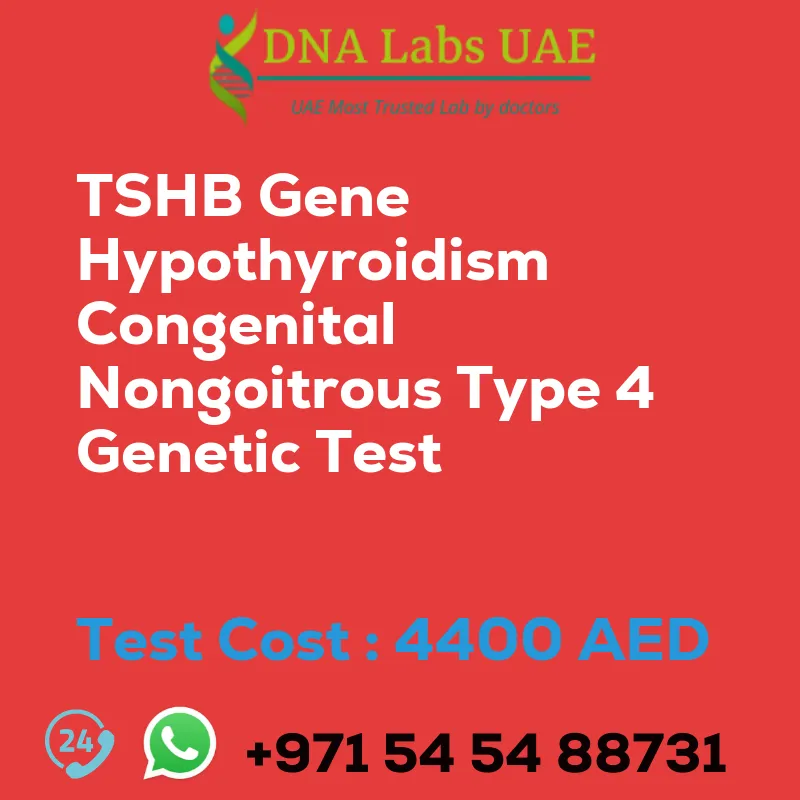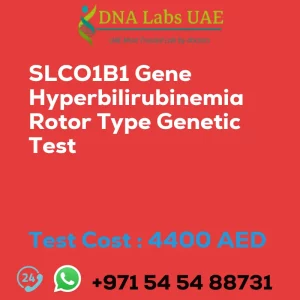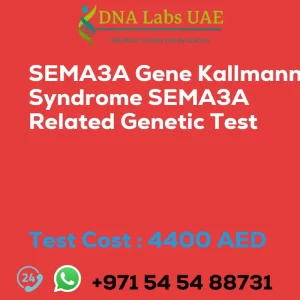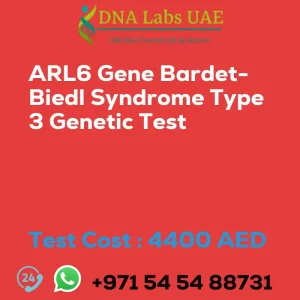TSHB Gene Hypothyroidism Congenital Nongoitrous Type 4 Genetic Test
Introduction
The TSHB gene is associated with the production of thyroid-stimulating hormone (TSH), which plays a crucial role in the regulation of thyroid gland function. Mutations in the TSHB gene can lead to a form of congenital hypothyroidism known as congenital nongoitrous hypothyroidism type 4. This condition is characterized by a lack of thyroid hormones from birth, with affected individuals having normal-sized thyroid glands.
Test Details
The TSHB Gene Hypothyroidism Congenital Nongoitrous Type 4 Genetic Test is a specialized genetic test offered by DNA Labs UAE. This test utilizes Next-Generation Sequencing (NGS) technology to analyze multiple genes simultaneously, specifically focusing on the TSHB gene. The cost of this test is AED 4400.0.
Test Components
- TSHB Gene Hypothyroidism Congenital Nongoitrous Type 4 Genetic Test
Sample Condition
The sample required for this test can be either blood, extracted DNA, or one drop of blood on an FTA card.
Report Delivery
The test results will be delivered within 3 to 4 weeks.
Method
The TSHB Gene Hypothyroidism Congenital Nongoitrous Type 4 Genetic Test utilizes NGS technology for analysis.
Test Type
This test falls under the category of Hepatology, Nephrology, and Endocrinology Disorders.
Doctor
The test can be requested by a General Physician.
Test Department
The TSHB Gene Hypothyroidism Congenital Nongoitrous Type 4 Genetic Test is conducted in the Genetics department.
Pre Test Information
Prior to undergoing the TSHB Gene Hypothyroidism Congenital Nongoitrous Type 4 Genetic Test, it is recommended to provide the clinical history of the patient. Additionally, a Genetic Counselling session may be conducted to draw a pedigree chart of family members affected with TSHB Gene Hypothyroidism Congenital Nongoitrous Type 4 NGS Genetic DNA Test gene TSHB.
Importance of the Test
NGS genetic testing plays a crucial role in identifying specific mutations or variants in the TSHB gene that may be causing congenital nongoitrous hypothyroidism type 4. This allows healthcare professionals to provide accurate diagnoses, assess the risk of the condition in other family members, and guide appropriate treatment and management strategies.
| Test Name | TSHB Gene Hypothyroidism congenital nongoitrous type 4 Genetic Test |
|---|---|
| Components | |
| Price | 4400.0 AED |
| Sample Condition | Blood or Extracted DNA or One drop Blood on FTA Card |
| Report Delivery | 3 to 4 Weeks |
| Method | NGS Technology |
| Test type | Hepatology Nephrology Endocrinology Disorders |
| Doctor | General Physician |
| Test Department: | Genetics |
| Pre Test Information | Clinical History of Patient who is going for TSHB Gene Hypothyroidism congenital nongoitrous type 4 NGS Genetic DNA Test. A Genetic Counselling session to draw a pedigree chart of family members affected with TSHB Gene Hypothyroidism congenital nongoitrous type 4 NGS Genetic DNA Test gene TSHB |
| Test Details |
The TSHB gene is associated with the production of thyroid-stimulating hormone (TSH), which plays a crucial role in the regulation of thyroid gland function. Mutations in the TSHB gene can lead to a form of congenital hypothyroidism known as congenital nongoitrous hypothyroidism type 4. Congenital hypothyroidism is a condition where the thyroid gland does not produce enough thyroid hormones from birth. In the case of congenital nongoitrous hypothyroidism type 4, affected individuals have normal-sized thyroid glands, unlike other forms of congenital hypothyroidism where the thyroid gland may be enlarged (goiter). NGS (Next-Generation Sequencing) genetic testing is a type of genetic testing that uses advanced sequencing technologies to analyze multiple genes simultaneously. In the context of TSHB gene mutations and congenital nongoitrous hypothyroidism type 4, NGS genetic testing can be used to identify specific mutations or variants in the TSHB gene that may be causing the condition. By identifying the specific genetic cause of congenital nongoitrous hypothyroidism type 4 through NGS genetic testing, healthcare professionals can provide accurate diagnoses, assess the risk of the condition in other family members, and potentially guide appropriate treatment and management strategies. |








